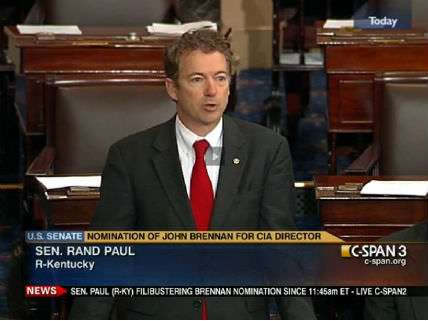Why Rand Paul's Exit Is Bad News for the Future of the Supreme Court
Paul challenged the reigning legal orthodoxies on both the left and the right.

The suspension of Rand Paul's 2016 presidential campaign is bad news when it comes to the crucial issues of constitutional law and the future of the U.S. Supreme Court. In stark contrast to his fellow GOP candidates, Paul repeatedly championed libertarian legal ideas and priorities, such as vigorous judicial enforcement of economic liberties and widespread judicial protection for the unenumerated right to privacy. Paul's exist means that there's no longer a major-party candidate challenging the reigning legal orthodoxies on both the left and the right.
Rand Paul first revealed his libertarian legal tendencies during his famous 13-hour Senate filibuster in March 2013, in which the Kentucky Republican invoked the Supreme Court's 1905 decision in Lochner v. New York as a positive example of the judiciary rejecting majority rule and standing up for unenumerated individual rights. In Lochner, the Supreme Court struck down an economic regulation because it violated the right to liberty of contract protected by the 14th Amendment. "The powers given to the government are few and defined," Paul declared from the Senate floor. "The freedoms left to you are many and undefined. And that's important." Paul's riff on Lochner came as part of a larger discussion about getting the government to stop trampling on the Constitution.
Less than two years later, Paul went further, telling an audience of conservatives that the legal philosophy known as judicial restraint has been a dismal failure. As an alternative, Paul urged conservatives to support an "activist" Supreme Court that would aggressively police the other branches of government. "I'm a judicial activist when it comes to Lochner," Paul declared. "I'm a judicial activist when it comes to the New Deal. But I'm also a judicial activist when it comes to Brown [v. Board of Education]. I think the [Supreme Court] was right to overturn state governments that were saying separate but equal is fine." When governments "do wrong we should overturn them," Paul said. "There is a role for the Supreme Court to mete out justice."
Paul also used that speech as an opportunity to champion the right to privacy, a right that many top conservative legal theorists do not recognize, since the right itself is not spelled out in the text of the Constitution. But as Paul argued on a different occasion, "Your rights are many and infinite. Your rights are unenumerated and you do have a right to privacy."
Such views have long been championed by libertarian lawyers, law professors, and activists, who maintain that conservative doctrines of judicial restraint and judicial deference have resulted in the scales of justice being tipped overwhelmingly in favor of big government.
Unfortunately for such libertarians, the remaining GOP contenders are not so attractive on legal issues.
Donald Trump, for example, is an outspoken advocate of eminent domain abuse who has repeatedly praised the Supreme Court's 2005 decision in Kelo v. City of New London, a disastrous ruling that undermined property rights while empowering government officials and their crony capitalist allies.
Ted Cruz, meanwhile, stands in direct opposition to the libertarian legal movement on the central issue of economic liberties and the Constitution. For example, in July 2015 Cruz attacked the Supreme Court's Lochner decision as a regrettable example of the Court's "imperial tendencies" and "long descent into lawlessness."
Unfortunately for Cruz, he undercut his own position in that speech by mangling the facts of Lochner, which he incorrectly described (while reading from a prepared text) as a case where "an activist Court struck down minimum wage laws" on behalf of an individual right "that has no basis in the language of the Constitution." (Cruz's opposition to Lochner also happens to be indistinguishable from Barack Obama's negative view of the case.)
In reality, Lochner was not a minimum wage case at all; it was a maximum working hours case, plain and simple. What's more, there is significant historical evidence showing that the individual right at issue in Lochner—liberty of contract—is deeply rooted in the text and history of the 14th Amendment.
With Rand Paul now gone from the 2016 race, the libertarian legal movement has lost its most promising potential ally in the White House. If any GOP candidate was likely to nominate libertarian-leaning judges and shake up the status quo, Rand Paul was it.


Show Comments (89)